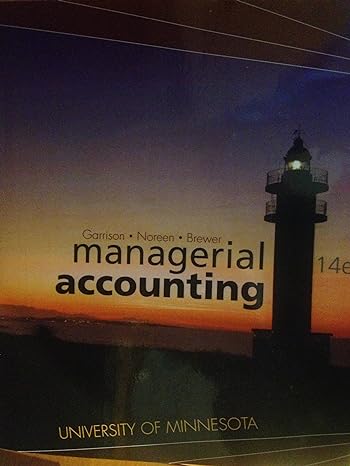Question
Question 1 If the merchandise costs $4,000, insurance in transit costs $200, tariff costs $50, processing the purchase order by the purchasing department costs $35,
Question 1
If the merchandise costs $4,000, insurance in transit costs $200, tariff costs $50, processing the purchase order by the purchasing department costs $35, and the company receiving dock personnel costs $15, what is the total cost charged to the merchandise?
|
| $4,000 |
|
| $4,250 |
|
| $4,285 |
|
| $4,300 |
Question 2
Merchandise inventory at the end of the year was inadvertently overstated. Which of the following statements correctly states the effect of the error on net income, assets, and owner's equity?
|
| net income is overstated, assets are overstated, stockholders' equity is overstated |
|
| net income is understated, assets are understated, stockholders' equity is overstated |
|
| net income is overstated, assets are overstated, stockholders' equity is understated |
|
| net income is understated, assets are understated, stockholders' equity is understated |
Question 3
Under a perpetual inventory system:
|
| accounting records continuously disclose the amount of inventory |
|
| the purchase returns and allowances account is credited when goods are returned to vendors |
|
| increases in inventory resulting from purchases are debited to Purchases |
|
| there is no need for a year-end physical count |
Question 4
The inventory method that assigns the most recent costs to cost of good sold is:
|
| LIFO |
|
| FIFO |
|
| average |
|
| specific identification |
Question 5
Under which method of inventory cost flows is the cost flow assumed to be in the reverse order in which the expenditures were made?
|
| average cost |
|
| weighted average |
|
| last-in, first-out |
|
| first-in, first-out |
Question 6
The following lots of a particular commodity were available for sale during the year: Beginning inventory.......... 10 units at $60 First purchase.................. 25 units at $63 Second purchase.............. 30 units at $64 Third purchase................. 10 units at $70 The firm uses the periodic system and there are 20 units of the commodity on hand at the end of the year. What is the cost of merchandise sold according to the first-in, first-out method?
|
| $3455 |
|
| $3395 |
|
| $3565 |
|
| $3300 |
Question 7
The following lots of a particular commodity were available for sale during the year: Beginning inventory is 20 units at $80; First purchase is 30 units at $79; Second purchase is 40 units at $81; and Third purchase is 30 units at $82. What is the total cost of the 25 units in inventory by the average cost method?
|
| $2,045 |
|
| $2,015 |
|
| $2,030 |
|
| $2,000 |
Question 8
The following lots of a particular commodity were available for sale during the year: Beginning inventory.......... 10 units at $60 First purchase.................. 25 units at $63 Second purchase.............. 30 units at $64 Third purchase................. 10 units at $70 The firm uses the periodic system and there are 20 units of the commodity on hand at the end of the year. What is the amount of inventory at the end of the year according to the last-in, first-out method?
|
| $1,240 |
|
| $1,230 |
|
| $1,340 |
|
| $1,220 |
Question 9
If merchandise inventory is being valued at cost and the purchase price is steadily falling, which method of costing will yield the largest net income?
|
| weighted average |
|
| LIFO |
|
| FIFO |
|
| average cost |
Question 10
If the cost of an item of inventory is $60, the current replacement cost is $65, and the selling price is $95, the amount included in inventory according to the lower of cost or market concept is:
|
| $120 |
|
| $60 |
|
| $65 |
|
| $95 |
Step by Step Solution
There are 3 Steps involved in it
Step: 1

Get Instant Access to Expert-Tailored Solutions
See step-by-step solutions with expert insights and AI powered tools for academic success
Step: 2

Step: 3

Ace Your Homework with AI
Get the answers you need in no time with our AI-driven, step-by-step assistance
Get Started


